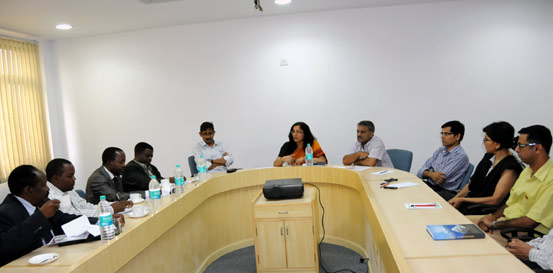You are here
Interaction with the Visiting Editors from Tanzania
Chairperson: Ms. Ruchita Beri

In the run up to the Prime Minister of India’s visit to Tanzania in May 2011, four editors from Tanzania visited IDSA in order to generate interest in local media in Tanzania about the VVIP visit and also give the visiting editors some exposure to understanding India.
Opening the session, Ms. Ruchita Beri briefed on the African region and India-Tanzania relations. She outlined that Africa was earlier portrayed as hopeless continent; a continent embraced with problems like colonialism, apartheid, under development and inequality etc. But much has changed since then and economic and political situation in Africa is slowly improving. Specifically, Tanzania is among top 20 fastest growing countries in Africa. The African countries are working towards political and economic integration. These positive trends have been possible due to active interest taken by the African leaders in seeking “African solutions for African problems.”
Over the years the strategic importance of Africa is growing. First, in terms of population Africa is set to become the third largest region in the near future. Africa’s natural wealth, particularly in hydrocarbons has also elevated the importance of the region. In recent years, piracy in the Indian Ocean region has led to a serious concern. Nevertheless, the consoling factor is that there is an increase in trade relations between India and Africa. India is engaging Africa bilaterally, regionally and at pan-African level. The first India India-Africa Forum Summit was held in 2008 and the second this year in Addis Ababa.
Thereafter, the discussion focused on the phenomenon of terrorism wherein it was mentioned that the kind of terrorism India faces originates outside the Indian Territory. It was also clarified that there is a difference between al-Qaeda type terrorism and the kind of terrorism India has been facing (which is Pakistan-sponsored). The related questions that were asked at this time included the issue of Pakistan-Osama linkages and the issue of Pakistan sovereignty being allegedly violated in Abbottabad.
On the question of Tanzania’s impression of India as an emerging player vis-à-vis China, it was answered that Tanzania views India as a rainbow nation which is home to diverse cultures, castes and communities but has still well-managed to unite them in the bond of nationhood. Few examples were also cited to argue increased India-Tanzania relations in Africa. Here, it was said that China and India are viewed in Africa as Asia’s emerging economies and it has been the fastest growing relationship with Africa for Asia in terms of increased business interaction.
Further, the discussion focused on democratisation, wherein the visiting delegation commended the success of Indian electoral system despite having a huge population and varied diversities. This has been called the strength of India along with the Information Technology sector where India is considered as a leader and also the small scale industries sector. The delegation also wondered whether a less democratic India would surpass China faster. It was replied that China’s policy towards Africa is one of neo-colonialism which focused on building infrastructure and extracting resources. On the other hand, India’s relationship with Africa is unique as it involves partnership in human resource development and increased interaction at both of the public sector and private sector level.
Finally, the role of African Union in Libyan crisis was discussed. It was noted by the visitors that AU has not been proactive on the issue. There was also some discussion on Gaddafi and his pan-Africa vision. The Tanzanian delegates said that the response of Tanzania was to respect Libya’s sovereignty. However they lamented that there are double standards within international community for external intervention and shadow powers are at play in Libya. They also opined that democracy is subjective. The session concluded on a happy note of possible extension of cooperation between the two nations in diverse fields for mutual benefit.
Report prepared by Mr. Babjee Pothuraju, Research Assistant, IDSA.
